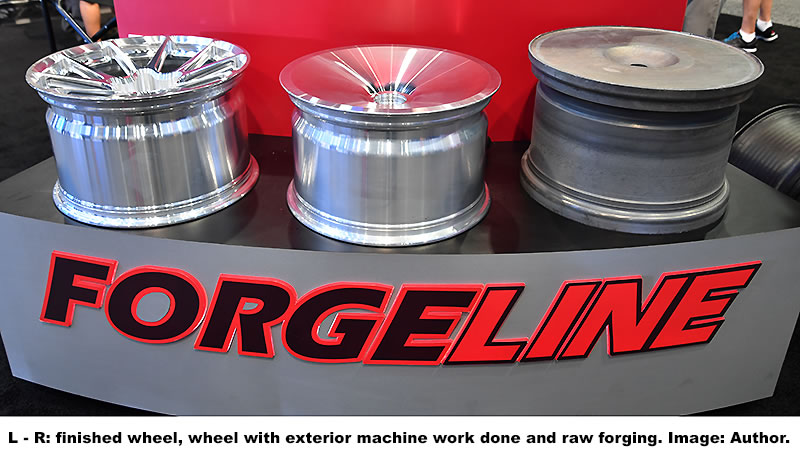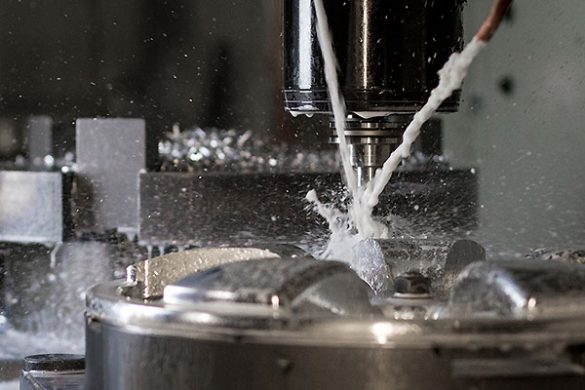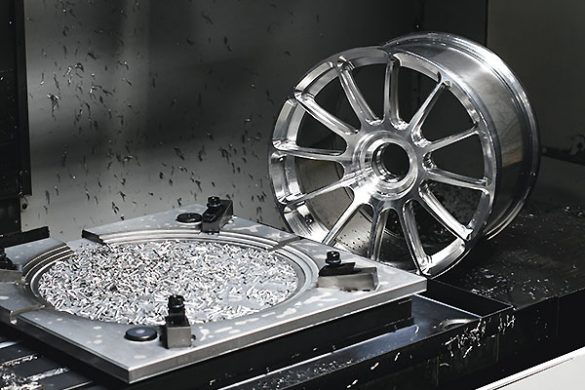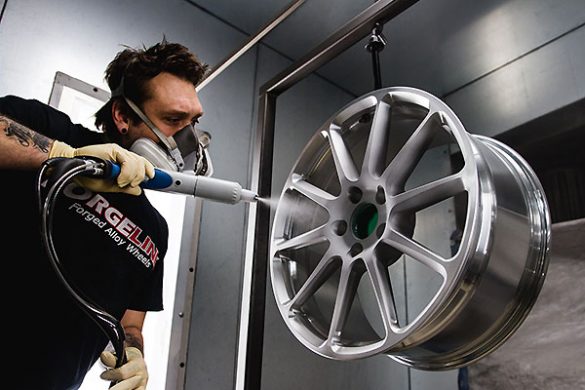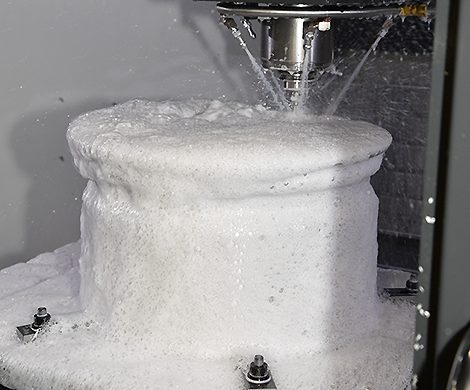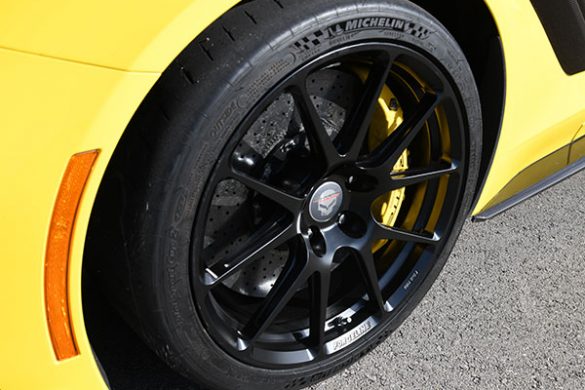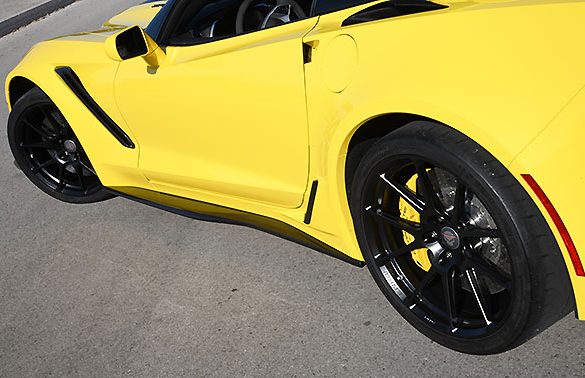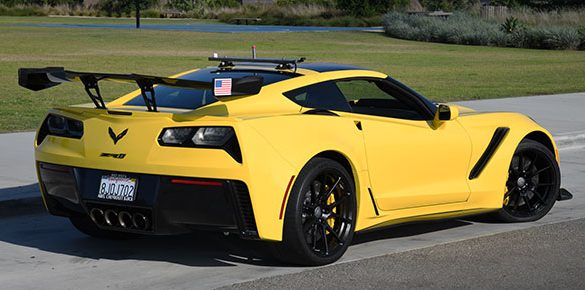These days, Forgeline Motorsports is my favorite wheel maker. I think they have some of the coolest wheel designs on the market. Another reason I like Forgeline? Almost all of each wheel is made-in-USA. The aluminum foundry work is done in Anaheim, California. Fasteners are made in Santa Paula, CA. The spun aluminum rims for three-piece wheels are made in Los Angeles. Manufacturing not done in California and all assembly work is done in Dayton, Ohio. The only part that’s not domestic is the valve stem Forgeline puts in wheels to be used without tire pressure sensors (TPS). A third reason why I like this company’s wheels is: from an engineering perspective, there is no difference between Forgeline race wheels and its street wheels. Both are built using the same materials and to the same quality specifications and safety standards.
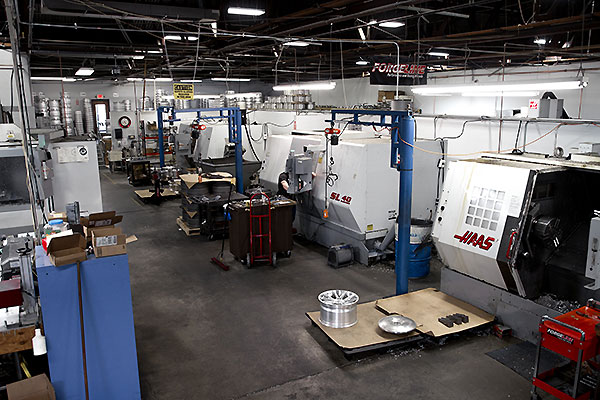 Forgeline Motorsports is the brainchild of twin brothers, Dave and Steve Schardt. Wheels are in their DNA as their Dad owns famed Dayton Wire Wheels, a company which was founded in 1916. “In 1970, Dad took over the plant after it went bankrupt and brought it back to a pretty sizable company,” Growing up, they worked for their Dad, Steve Schardt recalls. “That’s where we learned a lot of wheel stuff. We were lacing wheels when we were 13. Dad raced a Yenko Stinger (Chevrolet Corvair Corsa, modified by Yenko Chevrolet for SCCA road racing in the old D-Production class). It had Minilites on it which Dad distributed back then.”
Forgeline Motorsports is the brainchild of twin brothers, Dave and Steve Schardt. Wheels are in their DNA as their Dad owns famed Dayton Wire Wheels, a company which was founded in 1916. “In 1970, Dad took over the plant after it went bankrupt and brought it back to a pretty sizable company,” Growing up, they worked for their Dad, Steve Schardt recalls. “That’s where we learned a lot of wheel stuff. We were lacing wheels when we were 13. Dad raced a Yenko Stinger (Chevrolet Corvair Corsa, modified by Yenko Chevrolet for SCCA road racing in the old D-Production class). It had Minilites on it which Dad distributed back then.”
In 1994, Steve founded Forgeline Motorsports to custom-make wheels for road racing cars. “Back in the ’90s,” Steve Schardt stated, “no one in the United States was doing custom-made racing wheels. By ‘custom’ I mean a wide choice of diameters and offsets with rims that would clear disc brakes. In ’94, I decided to make a go of it. The business went very well, but I found out I’m a sales person and not one who runs a business.”
Once the Forgeline got going and was a hit amongst road racers, it became obvious that brother Dave’s management acumen in the wheel business would be an advantage so he joined Steve at Forgeline.
‘The first racer to run our wheels was P.D. Cunningham who ran a Honda Prelude in World Challenge,” Dave states. “From there, we hit World Challenge pretty hard. We were on Kenny Brown’s Mustangs, Lou Gilotti’s Mustangs and Bobby Archer’s Vipers. Eventually, almost half the fields in World Challenge racing back then were using our wheels.”
In 25 years, Forgeline has become one of the leading, high-end wheel makers in the World. One reason is their large portfolio of wheel designs. Forgelines come in two flavors: single-piece or “monoblock” and three-piece along with a wide variety of colors and finishes. The single-piece wheels are typically the lightest and are machined from one massive 110-pound forging. Forgeline three-piece wheels have spun aluminum rims and forged centers. Another reason for Foregline’s success is the wide variety of centers, rims and offsets the company has available in its three-piece line.
With racers liking Forgeline wheels, it wasn’t long before the market wanted one-piece and three-piece, custom-made-to-order wheels for road cars which were built with Forgeline’s designs, quality, reliability, durability, colors and finishes. One would think Forgeline’s street wheel business would be huge compared with motorsports but that’s not the case. The Schardts told us that, over the years, the company has maintained about a 50/50 mix of the two markets. One of the two biggest markets for Forgeline’s street wheels are Corvettes, especially C6 and C7 Z06es.
We asked the Brothers Schardt about their engineering and manufacturing processes. “At lot of other manufacturers make their race wheels thinner because there are no pot holes or other road hazards on a race track,” Steve Schardt states. “Those manufacturers usually market with the disclaimer: ‘These wheels are for racing only.’ We chose not to do that because we know someone is going to go off (track into the dirt and rocks) so our race wheels are as strong as our street wheels.”
“We do that for racers who do drive over ripple strips, bounce off track curbs or make contact with other cars,” Dave agreed. “Over the years, our wheels have earned a reputation as being tough as well as lightweight. In fact, we’re not always the lightest wheel and the reason for that is we made them durable. They were able to finish races when other wheels might fail and, of course–to win a race, first, you have to finish.”
Aluminum Precision Products (APP), a foundry in Anaheim California, supplies raw forgings Forgeline Motorsports uses in its wheels. APP is an industry leader in precision forgings of aluminum and titanium. The company was founded over 50 years ago to supply the aerospace and defense industries. Today, it is the authority on forging practices able to solve the toughest aluminum forging challenges. Its products are found on every major commercial and most military aircraft. The company is respected by every major airframe OEM worldwide. APP also makes forgings for the leading drag racing aluminum connecting rod manufacturer and it makes piston forgings for racing piston vendors. When the Schardt brothers went looking for a foundry to provide their aluminum forgings, their choice was simple: Aluminum Precision Products.
“It’s an aerospace company. It’s one of those companies which does what they say they are going to do,” Dave said about APP. “Every single piece we get from them is exactly what it’s supposed to be. We get metal certifications from them on every shipment. They offer full traceability. In short, they do business the way we do business.”
Aluminum Precision Products makes Forgeline parts from a proprietary version of 6061 aluminum heat treated to the T6 specification. “We call it ’60xx’ because they don’t want to tell us what it is.” Dave Schardt said. “It’s about 20% stronger than ordinary 6061. They don’t like using the term ‘super alloy’ but that’s kind of what it is.”
The rims used in Forgeline three-piece wheels are “spun aluminum” and are made using a cold-forming process. An aluminum disc is spun at high speed in a CNC forming machine. Rollers cold-form the material into the wheel rim shape. Forgeline spun aluminum rims are made by Triangle Tool Company in California. To better understand this process watch this YouTube video.
All machining operations at Forgeline are done in the company’s 11 Haas CNC lathes or CNC machining centers. Even the machines that make Forgeline wheels in the USA are made in America at Haas Automation’s huge factory in Oxnard, California. The Haas equipment is divided amongst two sections, one making single-piece wheels and the other making three-piece wheels. The single-piece production process takes a 110-lb forging and removes 85-90-pounds of material, all of which is recycled. To make a Forgeline single-piece wheel, It takes an hour on the CNC lathe and between an hour and four hours in a CNC machining center depending on what wheel design is being manufactured. Three-piece wheels take less time because the only on-site machine work is the center. Forgeline builds wheels to some tight tolerances. Maximum runout allowed for any of the company’s wheels is .020-in. With the Monoblock line, runout is rarely over .010-in.
From the machining department, wheel parts go into the grinding-and-polishing section where burrs and machining marks are removed and the wheels which are not to be powder coated are polished. Wheels which get powder coated are moved to Forgeline’s in-house coating facility. They bead blasted then are coated with whatever color the customer orders. Finally, they are baked for 20-minutes to cure the coating. Next comes wheel assembly and inspection. Last is packaging and shipping to the customer.
Yet another reason Forgeline’s products have done well in the market is its wheels are engineered with OE-level reliability and durability. Forgelines undergo the same type of destructive testing to which factory wheels are subjected and because every Forgeline wheel is either a one-piece forging or is a three-piece wheel with a forged center, they can still be lighter than many factory wheels which are casting or press-castings. It doesn’t matter if the Forgeline in question is a race wheel or a street wheel–they are all engineered to the same high standards and are manufactured with the same, stringent quality controls.
We do FEA (finite element analysis) on every single wheel we design,” Dave continued. “In the case of any new design that’s substantially different from a wheel we already make, we’ll send a sample to a testing lab. There are several standards for wheels used around the world,” Dave Schardt added, “but the one used in the U.S. is the SAE (Society of Automotive Engineers) Standard. Our wheels are built to that standard.
“They test three ways,” Dave went on. “A tire with a load on it tries to spread the wheel (rims) apart, so, first, they mount a tire on the wheel, then run it on a roller for 1,000,000 cycles at three times the wheel’s rated load. Then (assuming the wheel passes the load test, of course) they do an impact test which drops a 2120-lb weight on the wheel from 20-feet in the air,” Schardt continued. “The toughest test of all is the ‘rotary test’. The wheel is bolted on a hub. Then, the rim is heavily loaded with a force pushing the edge of the rim sideways. This test simulates the wheel on a car which is cornering with high lateral acceleration.”
Only after a prototype Forgeline wheel undergoes such extensive testing is a new wheel design released for production and sale.
Both Schardts are racers. Steve’s interest has been performance and race driving instruction. Dave did some professional road racing in SCCA World Challenge during the late-’90s and early-’00s. Today, the Brothers Schardt have turned to autocrossing a C5 Z06 rolling on–what else–Forgeline wheels.
Currently, the most high-profile use of Forgelines on Chevrolets in road racing are the Camaro GT4.Rs Pratt&Miller build for GT4 competitors. At the grass-roots racing level, Rich Willhoff, a two time Champion in the Optima Ultimate Street Car Series and a three-time LSFest winner runs Forgelines on his C6 Z06.
Glickenhaus, a new, U.S.-based specialty vehicle maker which plans to make road racing inspired street cars, has chosen Forgeline mono block wheels for its SCG series super- and hypercars. Looking over at the dark side, Ford has chosen mono block Forgelines for the new Ford GT Mk. II as well as the Mustang GT4.
About ten years ago Dave Schardt saw potential in the”pro-touring” movement. Today, Forgeline wheels are almost a standard in that hobby. Some of the biggest names in pro-touring competition, such as perennial Corvette racer, Danny Popp, who drove a much-modified C3 to three Good Guys Autocrosser of the Year titles, races on Forgelines.
I have two sets of Forgeline GS1Rs on my 2012 Z06 and on my 2019 ZR-1. Both sets are monoblock wheels coated satin black to match the black trim on both cars. Their sizes are stock: 10×19 fronts and 12×20 rears on the C6 and 10.5×19, fronts and 12×20 rears on the C7. The GS1R has what Forgeline calls an “open lug pocket” which offer easier access to the lugs. For racers that’s an advantage on pits stops and, for we street drivers, it makes it easier to access the wheel nuts with an impact gun and not damage the lug pocket.
A Forgeline customer’s first clue that what he/she has purchased are a cut above what the rest of the wheel vendors sell is packaging. It is designed to minimize potential damage in shipping. Wheels are fitted with sponge-rubber rim protection rings, are sealed in plastic bags. and are put in specifically-sized, heavy-duty cardboard boxes.
If you have a scale, you can learn a key feature of a Forgeline wheel: less weight. A stock C7 ZR1 front wheel weighs 28.5-lbs and a stock rear weighs 33-lbs. The Forgeline ZR1 front weighs 20.3-lbs and the rear weighs 22.7-lbs, so there is about a 30% decrease in unsprung weight by going from a cast or spun-cast stock wheel to a monoblock Forgeline. That’s freakin’ huge.
Each wheel has a unique serial number machined into the aluminum. Also, there is an understated Forgeline logo and the words “made-in-USA”. Forgeline wheels will accept factory tire pressure sensors. Both sets of our Forgeline have OE GM sensors. Also, wheels can be ordered with standard Forgeline center caps or they can be machined for OE wheel caps. We have one set with the standard Forgeline caps and another with the optional factory “Corvette Racing Jake” caps.
I don’t have many miles on the second set of GS1Rs, but there are about 8000 miles on my first set. I live just outside the greater L.A. area and often drive into L.A. on its crappy freeways where pot holes. broken concrete and tilted slabs mean those Forgelines take some pretty significant impacts. There are folks who have broken stock wheels on the poorly maintained highways and freeways common in California. So far, none of my Forgeline are any worse for wear after getting beat up on the freeway. That’s the sign of a premium monoblock aluminum wheel, but if you do have a minor “oopsie” with a Forgeline wheel, the company backs up its quality wheels with good service. If you have a wheel that sustained some chips, scratches or minor “road rash”, Forgeline’s “Refurbishing Department” can repair and re-powder coat wheels.
For more information, including styles, colors and finishes, see the Forgeline Motorsports web site

